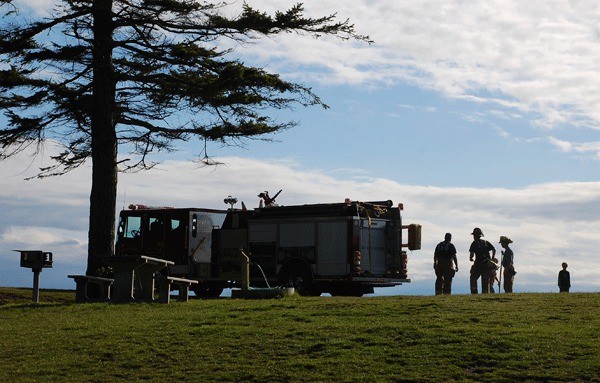Faced with the prospect of unprecedented budget cuts, the Washington State Parks and Recreation Commission has turned to the state for help in dousing financial flames being fanned by Whidbey Island firefighters.
In response to North Whidbey Fire and Rescue’s recent request to change its billing formula for emergency service calls — the request would increase the annual service fee by about 666 percent, from about $3,000 to about $20,000 per year — commission officials have asked the Office of the Attorney General to issue an opinion on the legality of the new billing method.
Although Fire Chief Marv Koorn says the intention is not to put undue burden on the cash-strapped commission and only to make the fire district more sustainable, park officials are nervous that the request could reverberate way beyond the boundaries of Whidbey Island.
“This is a huge issue across the state,” said Jack Hartt, manager of Deception Pass State Park.
The change being proposed is a move from a service fee based on the square footage of buildings at Deception Pass State Park to one based on the park’s total assessed value. While it would increase the fire district’s revenue stream, the change is something of a legal quagmire because under state law public land is tax exempt.
If the attorney general comes back and says that the change is OK, park officials worry that it could create a precedent that would affect a wide variety of public agencies, from parks to school districts. Fire districts across Washington would have a solid legal footing to begin charging them all more for their services.
According to Hartt, the commission is looking at this from a system-wide perspective. State park land is by its nature either beautiful, of historical importance, or both. That means it’s not cheap and a billing method based on property value could easily become a huge financial burden.
“These land values are exorbitant; this is expensive land,” Hartt said.
But Koorn argues that the current billing method is unsustainable and that the burden is being unfairly carried by Whidbey taxpayers. In 2009, the fire district responded to 36 calls at Deception Pass State Park and almost all were for emergencies other than fires, the only kind of call they are paid to respond to. State law does allow fire districts to charge for its response to fires.
Koorn said the vast majority were for search and rescues and medical calls to hot spots such as campgrounds, swimming areas and the Deception Pass bridge. Responding to each costs money and Koorn said the state should step up and pay its fair share.
He also said he made several calls to other fire districts around the state before suggesting the contract change. He claims that the investigation confirmed that some state parks are already being charged based on assessed value.
“We’re not the trend setters on this,” Koorn said.
North Whidbey Fire and Rescue has been a trailblazer in the past, however. This past March, they became the first, and only, Whidbey fire district to collect reimbursement for its response to motor vehicle accidents. The policy works by billing the insurance company of the driver responsible for the accident.
According to Koorn, the issue over the new fee has been on hold since the district received a letter from the commission that said it would not be paying for any services other than those related to structure fires until it hears back from the attorney general.
While the letter sparked a conversation at the district’s December board of commissioners meeting about whether the commission was instructing the district to only respond to fires, the commissioners made it clear that they would be going to all calls until the issue is resolved.
“We continue providing the service until we get some clarification from the attorney general’s office,” Commissioner Jerry Goen said. “It would be very unjust to anybody to say we’re not going to respond or administer aid.”
If the ruling comes back that fire districts cannot charge based on assessed value, Koorn said he will bring the issue back to the board for a decision about responses to calls. If the ruling says such a charge is permissible, Koorn said the district would begin negotiating similar service contracts at other Whidbey Island state parks as well.



